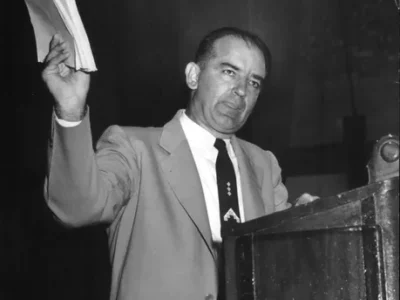John Roberts: Stupid Like a Fox
Hiding Behind Anti-intellectualism to Obscure a Political Agenda
Chief Justice Roberts doesn’t think much of law reviews:
Pick up a copy of any law review that you see and the first article is likely to be, you know, the influence of Immanuel Kant on evidentiary approaches in 18th-century Bulgaria, or something, which I’m sure was of great interest to the academic that wrote it, but isn’t of much help to the bar.
Where to start? One might wonder at the outset why in particular scholarship should be helpful to the bar, especially given the advent of electronic databases. Early law review articles collected and analyzed appellate cases because it was tedious and time-consuming for practicing lawyers to do it. That is far less true now, which means that legal scholarship has to change. My colleague Eugene Volokh, in his excellent book on Academic Legal Writing, says that one test of a good article should be: would an intelligent practicing lawyer be able to find this on his or her own? If yes, then don’t write the article.
Moreover, if a member of Congress said that she didn’t find something in the American Political Science Review useful, would we say that that casts doubt on the value of politics scholarship? Of course not.
But there are two more profound problems with the Chief’s complaint, which show a more ulterior motive.
First, it rests upon an assumption — overly recondite articles — that is demonstrably false. Fine, let’s pick a law review, say, the current issue of the UCLA Law Review. It concerns developments in complex litigation. It’s about as bread-and-butter as you can get. Okay, what about at Yale Law School, famously hyper-theoretical and detached? The current issue of the Yale Law Journal features two articles: one on mandatory sentencing and racial disparity, and another on the applications of Second Amendment jurisprudence to local governments. Again, that’s right in the doctrinal wheelhouse. I’m not denying that a lot of garbage shows up in law reviews, but it is hardly worse than that in any other scholarly journal in the humanities or social sciences, or newspapers, or on the floor of Congress, or in opinions of the Supreme Court. Sturgeon’s Law applies, as ever.
Can the Chief Justice read? Or he is simply making things up without bothering to check, as he so often does in his opinions?
I actually think it is a little more subtle than that. The Chief is a very intelligent man. He knows very well what is going in law reviews. His clerks come from those law reviews, and at some point he might be interested in what they do — say, when is thinking of hiring them. So what is going on?
The Chief is a man of Movement Conservatism. That movement has long despised academia as a redoubt of liberalism, which to some extent it is. What does Movement Conservatism do to redoubts of liberalism? It tries to undermine their legitimacy. And one good way to undermine legitimacy is through ridicule. Thus, academics — many of whom spend time writing appellate briefs, working with legal services agencies, serving as counsel on cases — are dismissed as heads-in-the-clouds theoreticians, unable to appreciate what real Ammurricans know, and are more interested in furren countries like — Bulgaria.
In other words, it’s not that Roberts doesn’t know what scholars are writing: he does. They are often writing about how his jurisprudence is an unprincipled attempt to advance plutocracy. He doesn’t really want to engage these critics, so he dismisses a straw man representation of them. He’s not an anti-intellectual: he is simply playing one on television to advance a more sinister agenda. It beats working, I suppose.
Reader Comments
3 Replies to “John Roberts: Stupid Like a Fox”
Comments are closed.






Something I’d liked from that NYT article quoting him: “The judge, lawyer or ordinary reader looking for accessible and timely accounts or critiques of legal developments is much better off turning to the many excellent law blogs.” Legal Planet: the new Law Review?
“an unprincipled attempt to advance plutocracy”? Then what would you call the jurisprudence of, say, William Brennan. He never made anything up, right?
The bigger irony of Chief Justice Roberts’ comments is that he actually cites law reviews on occasion.
Oh, Brennan made up stuff all the time! The difference is that Brennan didn’t go to his hearing, pretend that he was just an “umpire” who “called balls and strikes” and set himself up as a judicial minimalist. He was RELATIVELY forthright about what he was doing. So for example, his famous speech about state courts came right out and said that the Court was not adequately protecting constitutional rights. He was also quite forthright about his own beliefs about the death penalty (although I think quite wrong on the law: hard to say that the Constitution bans capital punishment in all circumstances when it specifically references “capital crimes.”).
What drives me crazy is the Right accusing progressives of judicial activism and then doing the exact same thing in different guises (and no, I’m not persuaded by the statistic about number of laws struck down — there are lots of ways to be activist without doing that, see, e.g., Bush v. Gore). It is better, and healthier to concede that there is play in the joints, and contrast the visions. I’m with Randy Barnett on this: talk of “activism” obscures far more than it illuminates.